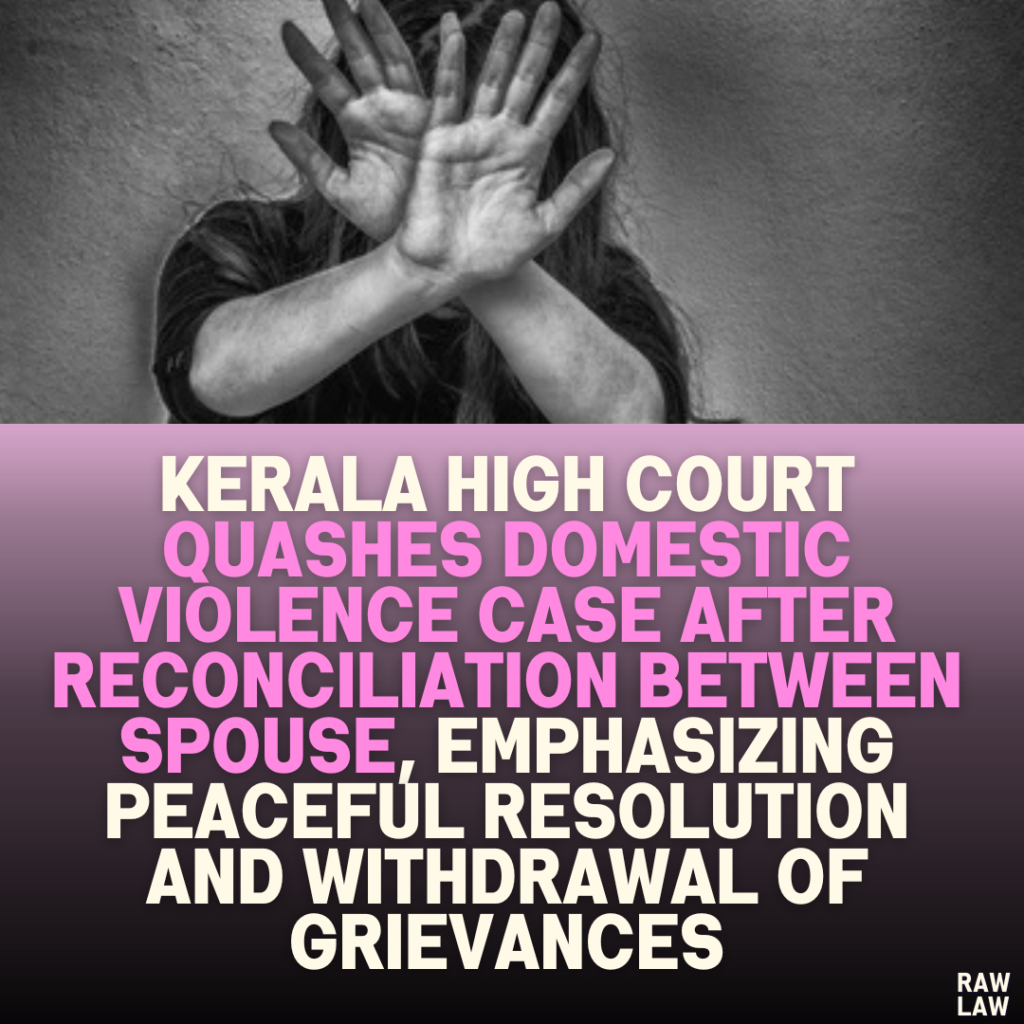Court’s Decision:
The Kerala High Court, in this instance, allowed the petition to quash the ongoing criminal proceedings against the petitioner in Crime No. 209/2023 of Muhamma Police Station, which was pending as C.C. No. 607/2022 before the Judicial Magistrate of First Class-II, Cherthala. The decision was made based on a settlement between the parties involved—namely, the petitioner (the accused) and the defacto complainant (the petitioner’s wife). The court noted that the matter had been resolved amicably between the parties, and thus, it was in the interest of justice to allow the petition to quash the proceedings.
Facts:
The petitioner was accused of committing offences under Sections 294(b), 323, and 498A of the Indian Penal Code (IPC). Section 294(b) pertains to using obscene language in public; Section 323 pertains to causing harm or hurt; and Section 498A deals with cruelty by a husband or his relatives against a woman. The defacto complainant in this case was the wife of the accused. The charges stemmed from alleged acts of cruelty and verbal abuse that had led to the filing of the complaint.
However, the critical development in the case was that the defacto complainant (the wife) filed an affidavit stating that she had resolved the issue with the petitioner, and she had no further grievances related to the case. The affidavit was supported by the Public Prosecutor, who confirmed that the settlement had been reached and that the complainant had expressed her willingness to have the case quashed. As a result of this settlement, the petitioner sought the quashing of the criminal proceedings, to allow for a peaceful resolution and the continuation of their marital life.
Issues:
The main legal issue before the court was whether the ongoing criminal proceedings should be quashed following the settlement between the parties. The court had to assess whether the continuation of the case was justified in light of the settlement and the withdrawal of the complainant’s grievances.
Petitioner’s Arguments:
The petitioner, through his legal counsel, argued that since the matter had been settled amicably between him and his wife, and the complainant had no objections to quashing the case, it was appropriate to terminate the proceedings. The petitioner emphasized that allowing the case to continue would only serve to prolong unnecessary legal battles and prevent the parties from moving on with their lives peacefully.
Respondent’s Arguments:
The respondent, represented by the Public Prosecutor, acknowledged the settlement between the parties. The defacto complainant submitted an affidavit affirming that she no longer wished to pursue the case and had reconciled with the petitioner. The prosecutor confirmed this position and did not oppose the quashing of proceedings. In essence, the Public Prosecutor supported the petitioner’s request on the grounds of the settlement and the withdrawal of the complainant’s allegations.
Analysis of the Law:
The court considered the legal framework under Section 528 of the Bharatiya Nagarik Suraksha Sanhita, 2023. This provision allows the court to exercise discretion in cases where the parties have reached a settlement and where continuing the proceedings would not serve any useful purpose. In domestic violence or related cases, the courts often consider the willingness of the parties to resolve the matter amicably and allow the quashing of proceedings if it promotes peace and reconciliation.
Precedent Analysis:
The court examined previous legal precedents where similar matters had been settled between the parties, leading to the quashing of criminal proceedings. In these cases, the courts had taken a lenient view, especially when both parties were in agreement and there were no public interest concerns that warranted the continuation of the case.
Court’s Reasoning:
The court reasoned that when the complainant, after having reconciled with the accused, no longer had any grievances, and both parties were in agreement, there was no reason to continue with the criminal proceedings. The court noted that such cases should be resolved in the interest of justice, as continuing with the trial in the absence of a dispute would serve no meaningful purpose. In addition, allowing the petition would facilitate the peaceful continuation of the marital relationship, which was in line with the principles of justice.
The court was also mindful of the fact that the defacto complainant had made her statement voluntarily, and there was no coercion or undue influence in her decision to withdraw the case. The affidavit filed by her clearly indicated her desire to move on and live peacefully with the petitioner.
Conclusion:
The Kerala High Court concluded that, in the present case, there were no grounds to continue the proceedings. Therefore, the petition for quashing the proceedings was allowed, and the criminal case against the petitioner was dismissed. The court quashed the proceedings in Crime No. 209/2023 of Muhamma Police Station, which was pending as C.C. No. 607/2022 before the Judicial Magistrate of First Class-II, Cherthala.
Implications:
The ruling in this case reinforces the principle that courts should consider the wishes of the parties in domestic matters, particularly in cases where reconciliation has occurred. It also sets a precedent for how similar cases may be handled in the future, where settlements between spouses or partners lead to the quashing of criminal proceedings. The judgment highlights the importance of fostering peaceful resolutions, especially in domestic cases, and could encourage more couples to resolve their differences amicably without the need for prolonged litigation.




Pingback: Calcutta High Court: "Adverse Possession Claims Require Trial; Dismissal Under Order VII Rule 11 CPC Limited to Clear Cases of Law Bar or Lack of Cause of Action" - Raw Law